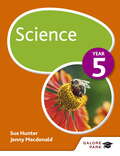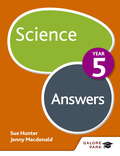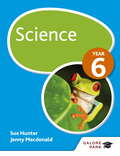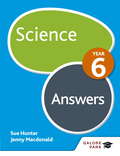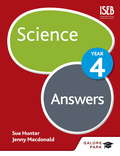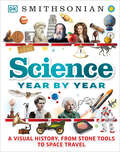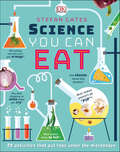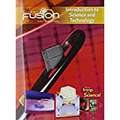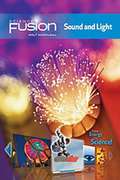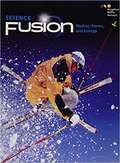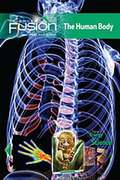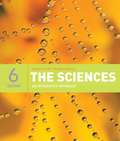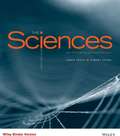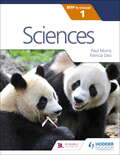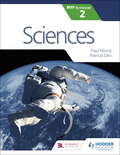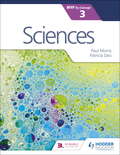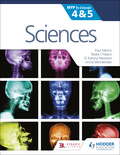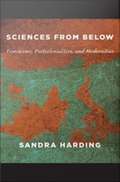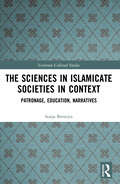- Table View
- List View
Science Year 5
by Sue Hunter Jenny MacdonaldExam Board: ISEBLevel: KS2Subject: ScienceFirst Teaching: September 2015First Exam: June 2017A stimulating and rigorous approach to Science that goes beyond the requirements of the National Curriculum for Year 5 pupils (aged 9 and above) preparing for Common Entrance and other independent entrance exams at 11+o Endorsed by ISEB to ensure full coverage of the Common Entrance 11+ syllabuso Develop key skills with clear explanations and diagramso Explore scientific concepts with lots of practical activitieso Challenge understanding with varied exercises and extension questionsGalore Park Science Year 5 Answers is available to purchase from the Galore Park website www.galorepark.co.uk
Science Year 5
by Jenny Macdonald Sue HunterA stimulating and rigorous approach to Science that goes beyond the requirements of the National Curriculum for Year 5 pupils (aged 9 and above) preparing for Common Entrance and other independent entrance exams at 11+o Endorsed by ISEB to ensure full coverage of the Common Entrance 11+ syllabuso Develop key skills with clear explanations and diagramso Explore scientific concepts with lots of practical activitieso Challenge understanding with varied exercises and extension questionsGalore Park Science Year 5 Answers is available to purchase from the Galore Park website www.galorepark.co.uk
Science Year 5 Answers
by Sue Hunter Jenny MacdonaldClear layout saves time marking work Enables efficient assessment of pupils' strengths and weaknesses Includes diagrams and working where necessary, to demonstrate how to present answers
Science Year 6
by Sue Hunter Jenny MacdonaldExam Board: ISEBLevel: KS2Subject: ScienceFirst Teaching: September 2015First Exam: June 2017A stimulating and rigorous approach to Science that goes beyond the requirements of the National Curriculum for Year 6 pupils (aged 10 and above) preparing for Common Entrance and other independent entrance exams at 11+ o Endorsed by ISEB to ensure full coverage of the Common Entrance 11+ syllabuso Develop key skills with clear explanations and diagramso Explore scientific concepts with lots of practical activitieso Challenge understanding with varied exercises and extension questionsGalore Park Science Year 6 Answers available to purchase from the Galore Park website: www.galorepark.co.uk
Science Year 6
by Jenny Macdonald Sue HunterA stimulating and rigorous approach to Science that goes beyond the requirements of the National Curriculum for Year 6 pupils (aged 10 and above) preparing for Common Entrance and other independent entrance exams at 11+ o Endorsed by ISEB to ensure full coverage of the Common Entrance 11+ syllabuso Develop key skills with clear explanations and diagramso Explore scientific concepts with lots of practical activitieso Challenge understanding with varied exercises and extension questionsGalore Park Science Year 6 Answers available to purchase from the Galore Park website: www.galorepark.co.uk
Science Year 6 Answers
by Sue Hunter Jenny MacdonaldExam Board: ISEBLevel: KS2Subject: ScienceFirst Teaching: September 2015First Exam: Summer 2017Clear layout saves time marking work. Enables efficient assessment of pupils' strengths and weaknesses. Includes diagrams and working where necessary, to demonstrate how to present answers.
Science Year 6 Answers
by Jenny Macdonald Sue HunterClear layout saves time marking work Enables efficient assessment of pupils' strengths and weaknesses Includes diagrams and working where necessary, to demonstrate how to present answers
Science Year by Year: A Visual History, From Stone Tools to Space Travel (DK Children's Year by Year)
by DKThis epic journey of scientific discovery starts in ancient times and travels through centuries of invention before fast forwarding into the future. From simple machines to modern-day marvels, you&’ll follow incredible illustrated timelines that plot the entire history of science and highlight the most momentous discoveries. A jaw-dropping collection of more than 1,500 photographs, illustrations, maps, and graphics charts the evolution of science year by year, century by century. You&’ll meet influential inventors and famous faces from the past, including Aristotle, Leonardo da Vinci, Isaac Newton, Charles Darwin, Marie Curie, and Stephen Hawking. You&’ll visit places of scientific importance, such as prehistoric cave art, Stonehenge, Hiroshima and the first atomic bomb, the Moon landings, and the Higgs boson particle. These huge events are made simple thanks to eye-catching images, helpful timelines, and accessible, informative text. Landmark people and periods are combined in this one stunning volume for children, showcasing the ideas, experiments, and technologies that have shaped our daily lives and transformed the world today. Aspiring scientists, get ready for a time traveling trip like no other.
Science You Can Eat: 20 Activities that Put Food Under the Microscope
by Stefan GatesDiscover the incredible, edible science that happens every time you cook, bake, or eat with this children's ebook that is part-cookbook, part-science reference.This exciting kids' ebook tackles all the tasty science questions you have about food - plus plenty more that you hadn't even thought of! Science You Can Eat will transform your kitchen into an awesome lab through 20 fun food experiments.This quest of gastronomic wonder is so much more than just another science ebook for kids! It explores the science of food by asking questions you're hungry to know the answers to and putting them to the test through fun experiments.Cooking is just delicious chemistry, and the science experiments in this adorable kids cookbook will prove it. Once you understand science, you understand food. Find out why popcorn goes "pop" as you test it out for yourself. Explore how taste is affected by smell, know if carrots really can turn you orange, and finally discover whether eating insects is the future of food.There is a fantastic mix of fun facts and knowledge, context, and science experiments for kids in this educational ebook. The experiments are easy to execute at home with things you have around the kitchen. The instructions are detailed but easy to understand, so some kids could even adventure solo through its pages.Enjoy the delightful weirdness of tricking your taste buds, making slime taste delicious, investigating some of the strangest flavors around, and extracting iron from your cereal! Science You Can Eat helps your little one understand what's happening with their food and why. Each page is guaranteed to leave you hungry for more - we'd wager even adults will learn a thing or two from this culinary escapade.Explore, Experiment, And Learn!Explore the world of weird, mind-blowing, and often gloriously revolting (but tasty) science behind the food we eat; from why onions make us cry to the sticky science of chewing gum.Packed with activities for kids that allow you to use the power of science in the most delicious way. You'll concoct color-changing potions, make scrumptious ice-cream in an instant, and much, much more.Embark on this incredible edible adventure with TV presenter Stefan Gates AKA &“The Gastronaut&” and turn the things we eat from the ordinary into the extraordinary. Some of food fueled science you'll learn about:- Unusual foods- The world's smelliest fruit- Salt and other marvelous minerals- Ways of cooking- Drinks that glow and so much more!
ScienceFusion: Introduction to Science and Technology
by Houghton Mifflin HarcourtScience Fusion Introduction to Science and Technology.
Sciencefusion: Student Edition Interactive Worktext Grades 6-8 Module J: Sound And Light 2012 (Sciencefusion)
by Houghton Mifflin Harcourt Publishing Company StaffA science textbook
ScienceFusion Interactive Worktext: Module I: Motion, Forces, And Energy
by Houghton Mifflin Harcourt StaffScienceFusion: Student Edition Interactive Worktext Module I: Motion, Forces, and Energy 2017
ScienceFusion, Module C: The Human Body (Interactive Worktext Grades 6-8,)
by The Editors at the Holt McDougalThis book with a student centred approach features: Learning science concepts and vocabulary Building inquiry, STEM, and 21st Century Skills Incorporating math and writing in each science lesson.
The Sciences: An Integrated Approach (Sixth Edition)
by James Trefil Robert M. HazenOver 100,000 readers have relied on Trefil to gain a better understanding of physics, chemistry, astronomy, earth sciences, and biology. The book focuses on the great ideas in each field while showing readers how core scientific principles connect to their daily lives. The sixth edition emphasizes important themes and relationships, along with new real world connections. Scientific American has been added to the book along with completely updated examples. The presentation also employs a more visual approach that includes new illustrations and visuals. In addition, new problems help readers answer the big questions in science.
The Sciences (8th Edition): An Integrated Approach
by James Trefil Robert M. Hazen<P>The Sciences: An Integrated Approach, Binder Ready Version, 8th Edition by James Trefil and Robert Hazen uses an approach that recognizes that science forms a seamless web of knowledge about the universe. <P>This text fully integrates physics, chemistry, astronomy, earth sciences, and biology and emphasizes general principles and their application to real-world situations. <P>The goal of the text is to help students achieve scientific literacy.<P> Applauded by students and instructors for its easy-to-read style and detail appropriate for non-science majors, the eighth edition has been updated to bring the most up-to-date coverage to the students in all areas of science.
Sciences for the IB MYP 1
by Paul MorrisExam Board: IBLevel: MYPSubject: ScienceFirst Teaching: September 2016First Exam: June 2017Develop your skills to become an inquiring learner; ensure you navigate the MYP framework with confidence using a concept-driven and assessment-focused approach to Sciences presented in global contexts.- Develop conceptual understanding with key MYP concepts and related concepts at the heart of each chapter.- Learn by asking questions with a statement of inquiry in each chapter. - Prepare for every aspect of assessment using support and tasks designed by experienced educators.- Understand how to extend your learning through research projects and interdisciplinary opportunities.Contents1 What do scientists do?2 What changes?3 How do living things work?4 What makes change happen?5 How can we study the living world?6 Where do we fit into the world?GlossaryAcknowledgementsIndex
Sciences for the IB MYP 1
by Paul Morris Patricia DeoExam Board: IBLevel: MYPSubject: ScienceFirst Teaching: September 2016First Exam: June 2017Develop your skills to become an inquiring learner; ensure you navigate the MYP framework with confidence using a concept-driven and assessment-focused approach to Sciences presented in global contexts.- Develop conceptual understanding with key MYP concepts and related concepts at the heart of each chapter.- Learn by asking questions with a statement of inquiry in each chapter. - Prepare for every aspect of assessment using support and tasks designed by experienced educators.- Understand how to extend your learning through research projects and interdisciplinary opportunities.
Sciences for the IB MYP 2
by Paul Morris Patricia DeoExam Board: IBLevel: MYPSubject: ScienceFirst Teaching: September 2016First Exam: June 2017Develop your skills to become an inquiring learner; ensure you navigate the MYP framework with confidence using a concept-driven and assessment-focused approach to Sciences presented in global contexts.- Develop conceptual understanding with key MYP concepts and related concepts at the heart of each chapter.- Learn by asking questions with a statement of inquiry in each chapter. - Prepare for every aspect of assessment using support and tasks designed by experienced educators.- Understand how to extend your learning through research projects and interdisciplinary opportunities.Contents list1 Where are we now and where are we going? 2 How do we map matter?3 Who are we? 4 How can we find out? 5 How does our planet work?6 How do we respond to our world?
Sciences for the IB MYP 3
by Paul Morris Patricia DeoA concept-driven and assessment-focused approach to Sciences teaching and learning.- Approaches each chapter with statements of inquiry framed by key and related concepts, set in a global context- Supports every aspect of assessment using tasks designed by an experienced MYP educator- Differentiates and extends learning with research projects and interdisciplinary opportunities- Applies global contexts in meaningful ways to offer an MYP Sciences programme with an internationally-minded perspective
Sciences for the IB MYP 3
by Paul Morris Patricia DeoA concept-driven and assessment-focused approach to Sciences teaching and learning.- Approaches each chapter with statements of inquiry framed by key and related concepts, set in a global context- Supports every aspect of assessment using tasks designed by an experienced MYP educator- Differentiates and extends learning with research projects and interdisciplinary opportunities- Applies global contexts in meaningful ways to offer an MYP Sciences programme with an internationally-minded perspective
Sciences for the IB MYP 4&5: MYP by Concept
by Paul Morris Radia Chibani Kahina Meziane Anna MichaelidesDevelop your skills to become an inquiring learner; ensure you navigate the MYP framework with confidence using a concept-driven and assessment-focused approach to Sciences presented in global contexts.· Develop conceptual understanding with key MYP concepts and related concepts at the heart of each chapter. · Learn by asking questions for a statement of inquiry in each chapter. · Prepare for every aspect of assessment using support and tasks designed by experienced educators.· Understand how to extend your learning through research projects and interdisciplinary opportunities.· Think internationally with chapters and concepts set in global contexts.
Sciences for the IB MYP 4&5: MYP by Concept
by Paul Morris Radia Chibani Kahina Meziane Anna MichaelidesDevelop your skills to become an inquiring learner; ensure you navigate the MYP framework with confidence using a concept-driven and assessment-focused approach to Sciences presented in global contexts.· Develop conceptual understanding with key MYP concepts and related concepts at the heart of each chapter. · Learn by asking questions for a statement of inquiry in each chapter. · Prepare for every aspect of assessment using support and tasks designed by experienced educators.· Understand how to extend your learning through research projects and interdisciplinary opportunities.· Think internationally with chapters and concepts set in global contexts.
Sciences from Below: Feminisms, Postcolonialities, and Modernities
by Sandra HardingIn Sciences from Below, the esteemed feminist science studies scholar Sandra Harding synthesizes modernity studies with progressive tendencies in science and technology studies to suggest how scientific and technological pursuits might be more productively linked to social justice projects around the world. Harding illuminates the idea of multiple modernities as well as the major contributions of post-Kuhnian Western, feminist, and postcolonial science studies. She explains how these schools of thought can help those seeking to implement progressive social projects refine their thinking to overcome limiting ideas about what modernity and modernization are, the objectivity of scientific knowledge, patriarchy, and Eurocentricity. She also reveals how ideas about gender and colonialism frame the conventional contrast between modernity and tradition. As she has done before, Harding points the way forward in Sciences from Below. Describing the work of the post-Kuhnian science studies scholars Bruno Latour, Ulrich Beck, and the team of Michael Gibbons, Helga Nowtony, and Peter Scott, Harding reveals how, from different perspectives, they provide useful resources for rethinking the modernity versus tradition binary and its effects on the production of scientific knowledge. Yet, for the most part, they do not take feminist or postcolonial critiques into account. As Harding demonstrates, feminist science studies and postcolonial science studies have vital contributions to make; they bring to light not only the male supremacist investments in the Western conception of modernity and the historical and epistemological bases of Western science but also the empirical knowledge traditions of the global South. Sciences from Below is a clear and compelling argument that modernity studies and post-Kuhnian, feminist, and postcolonial sciences studies each have something important, and necessary, to offer to those formulating socially progressive scientific research and policy.
The Sciences in Islamicate Societies in Context: Patronage, Education, Narratives (Variorum Collected Studies)
by Sonja BrentjesThis Variorum volume reprints ten papers on contextual elements of the so-called ancient sciences in Islamicate societies between the thirteenth and the seventeenth centuries. They address four major themes: the ancient sciences in educational institutions; courtly patronage of science; the role of the astral and other sciences in the Mamluk sultanate; and narratives about knowledge. The main arguments are directed against the then dominant historiographical claims about the exclusion of the ancient sciences from the madrasa and cognate educational institutes, the suppression of philosophy and other ancient sciences in Damascus after 1229, the limited role of the new experts for timekeeping in the educational and professional exercise of this science, and the marginal impact of astrology under Mamluk rule. It is shown that the muwaqqits (timekeepers) were important teachers at madrasas and Sufi convents, that Mamluk officers sought out astrologers for counselling and that narratives about knowledge reveal important information about scholarly debates and beliefs. Colophons and dedications are used to prove that courtly patronage for the ancient sciences continued uninterrupted until the end of the seventeenth century. Furthermore, these papers refute the idea of a continued and strong conflict between the ancient and modern sciences, showing rather shifting alliances between various of them and their regrouping in the classifications of the entire disciplinary edifice. These papers are suited for graduate teaching in the history of science and the intellectual, cultural and social history of the Middle East and for all readers interested in the study of the contexts of the sciences.
